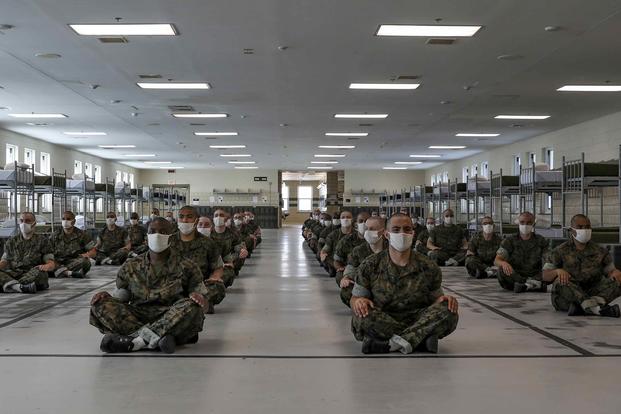The military has launched its second big study looking at how the novel coronavirus affects young people, this time at a Marine Corps' recruit depot that saw an early COVID-19 outbreak.
More than 1,000 people at Recruit Depot Parris Island in South Carolina have volunteered to participate in the COVID-19 Health Action Response for Marines -- or CHARM -- study. Personnel from the Maryland-based Naval Medical Research Center are leading the study, which started May 4 and will last about four months.
Read next: Hundreds of Sailors Participated in a COVID-19 Antibodies Study. Here's What Was Learned
Researchers leading the CHARM study hope to learn more about the new virus, which has created a global pandemic, infecting nearly eight million people worldwide and killing more than 115,000 Americans.
"The objectives include understanding more about this new virus by identifying individuals who acquire COVID-19 with only mild or no symptoms, understanding the prevalence of the virus within the [boot camp] population, and assessing how the body responds to and fights the virus," said Regena Kowitz, a spokeswoman for Naval Medical Forces Pacific, which oversees all Navy medicine research and development efforts.
This is the second major study on the illness involving Defense Department personnel. The Navy and Centers for Disease Control and Prevention last week wrapped up a two-month study on the COVID-19 outbreak on the aircraft carrier Theodore Roosevelt. About 380 people participated in that study, which found 20% of volunteers who tested positive showed no symptoms of the illness, and masks and social distancing helped prevent new cases.
Navy Surgeon General Rear Adm. Bruce Gillingham said that, since volunteers in the CHARM study will be tracked for several weeks, the hope is researchers will learn more about possible immunity to COVID-19. Data from the study on the Roosevelt was based on one point in time, he said.
Volunteers at Parris Island each agree to give a nasal swab test and saliva and blood samples six times over a 56-day period, Kowitz said. The samples are taken on Days 1, 7, 14, 28, 42 and 56.
Those participating in the study also answer questionnaires and provide information about their demographics, living conditions, symptoms and risk assessments, Kowitz added.
The findings will help not only Parris Island plan for preventing and minimizing future outbreaks, she said, but the entire Defense Department.
The Marine Corps was the first military service to temporarily halt incoming shipments of new recruits at its East Coast training base. That was in March, after more than 20 people there tested positive for COVID-19, the sometimes-fatal illness caused by the coronavirus.
The military no longer releases information on outbreaks at specific locations, but an official with knowledge of the situation at Parris Island said there have been about 150 cases of COVID-19 at the South Carolina base. Nearly everyone who has tested positive there -- including recruits, drill instructors, other Marines and civilians -- has since recovered from the illness, the official said.
The Marine Corps, along with the other military services, has taken a host of steps to help prevent COVID-19 from spreading at boot camp. After resuming incoming shipments of recruits in April, the service began sending the new arrivals to the Citadel military college about 75 miles northeast of the training base for a 14-day quarantine.
Researchers ask recruits whether they're willing to volunteer for the CHARM study before they begin training, Kowitz said. To ensure no one feels compelled to participate, she said no one in the recruits' chain of command is present when they're asked.
"Additionally, all study personnel wear civilian attire throughout the recruitment and informed consent process, also to avoid the possibility of influencing participation," she added.
Drill instructors who have previously been infected with COVID-19 have also been asked to volunteer in a sub-study examining the immune system's response to the illness. That portion of the study, Kowitz said, will assess the possibility of the illness being spread by asymptomatic people.
-- Gina Harkins can be reached at gina.harkins@military.com. Follow her on Twitter @ginaaharkins.
Related: 'We Are Putting Lives in Danger': Recruiters Urge Boot Camp Closures Amid Pandemic













